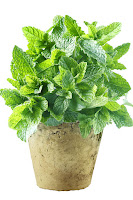The entire mint plant is used for various purposes, but different parts of the plant are often utilized for specific benefits. Here’s a breakdown of the main parts of the mint plant and how they are used:
1. Leaves
- Primary Use: The most commonly used
part of the mint plant is the leaves. They are harvested fresh
or dried and used to make mint tea, essential oils, and infusions.
- Health Benefits: Mint leaves are packed
with menthol, which gives mint its signature cooling effect.
They are known for soothing digestive issues, reducing nausea,
and alleviating headaches. Mint leaves are also commonly used in skin
care for their refreshing and cooling properties.
- Culinary Uses: The leaves are used to add
a refreshing flavor to drinks (like mojitos or mint juleps),
desserts (like mint chocolate), and savory dishes (such as salads or
sauces).
2. Stems
- Primary Use: While the stems are not
typically used for cooking or medicinal purposes in the same way as the
leaves, they do contain essential oils and can be used in making mint
oil or herbal infusions.
- Health Benefits: Stems can be used to extract
essential oils, which are rich in menthol, and have similar cooling, antiseptic,
and anti-inflammatory properties.
3. Flowers
- Primary Use: The flowers of the
mint plant are edible and can be used in cooking or as a garnish,
adding a mild minty flavor to dishes.
- Health Benefits: Although not commonly used
for medicinal purposes, mint flowers still contain small amounts of
essential oils and have the same cooling effect as the leaves. They
are sometimes added to herbal teas or tinctures for their
mild flavor and potential calming effects.
4. Roots
- Primary Use: The roots of the mint
plant are not commonly used in everyday cooking or for typical medicinal
purposes but can be used for growing new plants or in certain
traditional remedies.
- Health Benefits: While less commonly used,
mint roots can sometimes be used in herbal medicine to aid
digestion or soothe certain ailments, but they are generally not a primary
source of mint’s benefits.
5. Essential Oil (Extracted from Leaves and Stems)
- Primary Use: Mint essential oil,
extracted primarily from the leaves and stems of the plant, is widely used
in aromatherapy, massage oils, cosmetics, and cleaning products.
- Health Benefits: Mint oil is known
for its antiseptic, anti-inflammatory, and analgesic
properties. It’s used to relieve headaches, alleviate muscle
pain, and improve mental clarity. It’s also a popular ingredient in oral
care products like toothpaste and mouthwash because of its antibacterial
properties.
Conclusion
Mint
plants are prized primarily for their leaves, which are rich in aromatic
oils, especially menthol. These leaves are used in cooking, herbal teas,
cosmetics, medicines, and even as a natural pest repellent. The oils extracted
from the leaves are also widely utilized in flavorings, fragrances, and
therapeutic products.
While the
leaves are the most commonly used part, the stems and flowers can
also be utilized. The stems may be added to infusions, while the flowers,
though small, can serve as edible decorations or attract pollinators in
gardens.
Mint truly makes the most out of its greenery!










